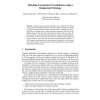Free Online Productivity Tools
i2Speak
i2Symbol
i2OCR
iTex2Img
iWeb2Print
iWeb2Shot
i2Type
iPdf2Split
iPdf2Merge
i2Bopomofo
i2Arabic
i2Style
i2Image
i2PDF
iLatex2Rtf
Sci2ools
EKAW
2006
Springer
2006
Springer
Matching Unstructured Vocabularies Using a Background Ontology
Existing ontology matching algorithms use a combination of lexical and structural correspondance between source and target ontologies. We present a realistic case-study where both types of overlap are low: matching two unstructured lists of vocabulary used to describe patients at Intensive Care Units in two different hospitals. We show that indeed existing matchers fail on our data. We then discuss the use of background knowledge in ontology matching problems. In particular, we discuss the case where the source and the target ontology are of poor semantics, such as flat lists, and where the background knowledge is of rich semantics, providing extensive descriptions of the properties of the concepts involved. We evaluate our results against a Gold Standard set of matches that we obtained from human experts.
EKAW 2006 | Information Management | Ontology Matching | Ontology Matching Algorithms | Ontology Matching Problems |
| Added | 22 Aug 2010 |
| Updated | 22 Aug 2010 |
| Type | Conference |
| Year | 2006 |
| Where | EKAW |
| Authors | Zharko Aleksovski, Michel C. A. Klein, Warner ten Kate, Frank van Harmelen |
Comments (0)

